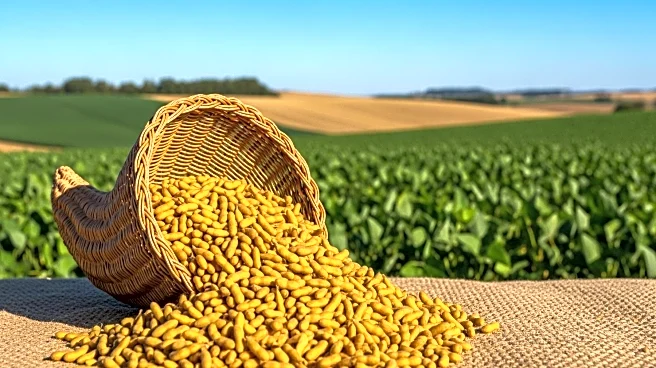What is the story about?
What's Happening?
Michigan agriculture leaders are expressing concern over the potential long-term economic impact of lost soybean exports, particularly to China. During a Farmers for Free Trade event in Michigan, industry experts highlighted the ripple effects that the absence of U.S. soybean exports could have on various commodities. Brian Kuehl, Executive Director of Farmers for Free Trade, emphasized that losing China's demand for 14 billion bushels of soybeans is not a short-term issue that can be easily resolved. He warned that failing to address this properly could result in permanent market losses and a weakened competitive position for U.S. agriculture. Robert Geers, Vice President of Michigan Agriculture Commodities, stressed the importance of trade certainty for farmers, who plan their operations months in advance. Tim Boring, Director of the Michigan Department of Agriculture and Rural Development, noted that trade disputes have already led to decreased exports in several specialty crops, including dry beans, fruits, and vegetables.
Why It's Important?
The loss of soybean exports to China represents a significant threat to Michigan's agricultural economy, which relies heavily on international trade. Soybeans are a major commodity, and disruptions in their export can lead to broader economic challenges for farmers and related industries. The situation underscores the critical need for stable trade policies to ensure the continued success of Michigan's agriculture sector. The potential long-term loss of markets could affect not only soybean producers but also those involved in the production and export of other crops, such as dry beans and specialty fruits and vegetables. This could lead to reduced income for farmers, job losses in agriculture-related industries, and a weakened position in global agricultural markets.
What's Next?
Agriculture leaders are likely to continue advocating for stable and predictable trade policies to mitigate the impact of lost exports. Efforts may focus on negotiating new trade agreements or improving existing ones to restore market access and ensure the competitiveness of U.S. agricultural products. Stakeholders, including farmers, industry associations, and government officials, may engage in discussions to explore alternative markets and diversify export strategies. The ongoing 'Motorcade for Free Trade' tour across the Midwest aims to raise awareness about the importance of agricultural trade and encourage policy changes that support the industry.
Beyond the Headlines
The current trade disruptions highlight broader issues within the global agricultural trade system, including the vulnerability of farmers to geopolitical tensions and market fluctuations. The situation may prompt discussions on the need for more resilient and diversified agricultural practices that can withstand international trade challenges. Additionally, there may be increased interest in exploring sustainable agricultural methods and technologies to enhance productivity and reduce dependency on specific export markets.

















